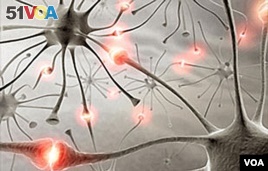January 31,2013
A new study said it’s possible to substantially reduce the number of epilepsy cases in Africa. The neurological disorder, which is characterized by seizures, is much more common in poor countries and rural areas.
The study is the largest ever done on epilepsy in Sub-Saharan Africa. Nearly 600,000 people were evaluated in five countries: Kenya, South Africa, Uganda, Tanzania and Ghana.

Developing countries bear most of the world's epilepsy burden. (WHO)
“Epilepsy is an abnormal discharge within the brain, such that the person who has it experiences abnormal convulsive movements as a result of this abnormal discharge. There’s a strong genetic component to it. In some cases a strong family history. There are genes which have been associated with it,” said Psychiatry Professor Charles Newton of the Welcome Trust and Oxford University, who led the research.
Epilepsy can cause not only physical suffering, but emotional pain as well.
“In many African communities the cause is attributed to ancestors, spiritual causes and even witchcraft. There’s a lot of stigma attached to epilepsy. The people who have epilepsy are less likely to go to school; are less likely to marry; are less likely to get jobs,” he said.
Newton and his team said the study is the “first to reveal the true extent of the problem and the impact of different risk factors.” And it’s not just genetics. One big risk factor is parasites. The study found that adults, who had been exposed to a parasitic disease, were up to three times more likely to develop epilepsy.
“The ones that we identified were onchocerciasis, which is a parasite associated with river blindness; Toxocara and taxoplasmosis – both of which are transmitted by cats; neurocysticercosis, which is transmitted by pigs. And we have some evidence to suggest that malaria may also be contributing to this,” he said.
The adults were actually exposed to parasitic diseases during childhood. However, it took many years for the parasites to damage the brain enough to trigger epilepsy.
As for children, the study cited different factors
“In the children under 18 years of age, we found that although the parasitic causes were there they weren’t as important as the abnormal pregnancies of their mothers – and particularly events that occurred around their birth. So it looks like that these children are suffering from birth trauma. So, for example, if the mother has a prolonged second-stage labor or if the child comes out and is not breathing and hasn’t got any oxygen going to the brain, these may be responsible or factors in the pathway for developing brain damage,” said Newton.
Newton said that many of these children are born at home where there is no emergency care available should complications arise.
The study said that parasitic disease control projects can help to greatly reduce the number of epilepsy cases. One example is the success of efforts to control river blindness. It recommended expanding river blindness prevention programs, as well as vaccinating animals against certain diseases. That could help prevent the spread of parasites to humans.
As for birth trauma, better pre-and-ante natal care in developing countries could greatly reduce the risk of epilepsy. Professor Newton added that these recommendations could be implemented at a reasonable cost. About 70 million people worldwide suffer from epilepsy.